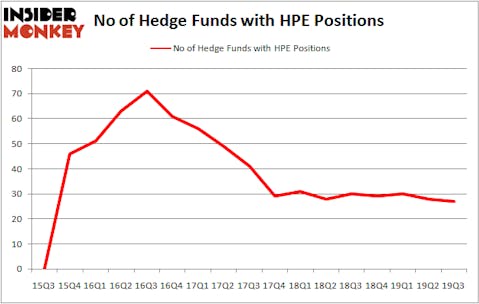We are still in an overall bull market and many stocks that smart money investors were piling into surged in 2019. Among them, Facebook and Microsoft ranked among the top 3 picks and these stocks gained more than 57% each. Hedge funds’ top 3 stock picks returned 45.7% last year and beat the S&P 500 ETFs by 14.5 percentage points. That’s a big deal. This is why following the smart money sentiment is a useful tool at identifying the next stock to invest in.
Hewlett Packard Enterprise Company (NYSE:HPE) has experienced a decrease in enthusiasm from smart money in recent months. Our calculations also showed that HPE isn’t among the 30 most popular stocks among hedge funds (click for Q3 rankings and see the video at the end of this article for Q2 rankings).
In the financial world there are a large number of tools investors have at their disposal to grade stocks. A pair of the most under-the-radar tools are hedge fund and insider trading indicators. We have shown that, historically, those who follow the top picks of the best fund managers can outperform the broader indices by a solid amount. Insider Monkey’s flagship best performing hedge funds strategy returned 91% since May 2014 and outperformed the Russell 2000 ETFs by nearly 40 percentage points. Our short strategy outperformed the S&P 500 short ETFs by 20 percentage points annually (see the details here). That’s why we believe hedge fund sentiment is a useful indicator that investors should pay attention to.

Jeffrey Talpins of Element Capital
We leave no stone unturned when looking for the next great investment idea. For example Europe is set to become the world’s largest cannabis market, so we check out this European marijuana stock pitch. We read hedge fund investor letters and listen to stock pitches at hedge fund conferences. This December, we recommended Adams Energy as a one-way bet based on an under-the-radar fund manager’s investor letter and the stock is still extremely cheap despite already gaining 20 percent. With all of this in mind let’s take a look at the fresh hedge fund action regarding Hewlett Packard Enterprise Company (NYSE:HPE).
How are hedge funds trading Hewlett Packard Enterprise Company (NYSE:HPE)?
At Q3’s end, a total of 27 of the hedge funds tracked by Insider Monkey held long positions in this stock, a change of -4% from one quarter earlier. By comparison, 30 hedge funds held shares or bullish call options in HPE a year ago. With hedgies’ capital changing hands, there exists a select group of key hedge fund managers who were adding to their holdings considerably (or already accumulated large positions).

Among these funds, Pzena Investment Management held the most valuable stake in Hewlett Packard Enterprise Company (NYSE:HPE), which was worth $504.3 million at the end of the third quarter. On the second spot was Winton Capital Management which amassed $54.5 million worth of shares. GAMCO Investors, Citadel Investment Group, and Arrowstreet Capital were also very fond of the stock, becoming one of the largest hedge fund holders of the company. In terms of the portfolio weights assigned to each position Pzena Investment Management allocated the biggest weight to Hewlett Packard Enterprise Company (NYSE:HPE), around 2.74% of its 13F portfolio. Polaris Capital Management is also relatively very bullish on the stock, earmarking 0.83 percent of its 13F equity portfolio to HPE.
Due to the fact that Hewlett Packard Enterprise Company (NYSE:HPE) has experienced falling interest from the entirety of the hedge funds we track, logic holds that there were a few money managers who were dropping their full holdings by the end of the third quarter. Interestingly, Steve Cohen’s Point72 Asset Management said goodbye to the biggest investment of all the hedgies tracked by Insider Monkey, worth an estimated $1.5 million in stock. Renaissance Technologies, also said goodbye to its stock, about $0.9 million worth. These transactions are interesting, as aggregate hedge fund interest fell by 1 funds by the end of the third quarter.
Let’s now take a look at hedge fund activity in other stocks – not necessarily in the same industry as Hewlett Packard Enterprise Company (NYSE:HPE) but similarly valued. We will take a look at Imperial Oil Limited (NYSE:IMO), Palo Alto Networks Inc (NYSE:PANW), Expedia Group, Inc. (NASDAQ:EXPE), and Fifth Third Bancorp (NASDAQ:FITB). All of these stocks’ market caps are similar to HPE’s market cap.
| Ticker | No of HFs with positions | Total Value of HF Positions (x1000) | Change in HF Position |
|---|---|---|---|
| IMO | 11 | 42957 | -1 |
| PANW | 47 | 2862155 | 2 |
| EXPE | 33 | 2622304 | 0 |
| FITB | 34 | 1027583 | 5 |
| Average | 31.25 | 1638750 | 1.5 |
View table here if you experience formatting issues.
As you can see these stocks had an average of 31.25 hedge funds with bullish positions and the average amount invested in these stocks was $1639 million. That figure was $822 million in HPE’s case. Palo Alto Networks Inc (NYSE:PANW) is the most popular stock in this table. On the other hand Imperial Oil Limited (NYSE:IMO) is the least popular one with only 11 bullish hedge fund positions. Hewlett Packard Enterprise Company (NYSE:HPE) is not the least popular stock in this group but hedge fund interest is still below average. This is a slightly negative signal and we’d rather spend our time researching stocks that hedge funds are piling on. Our calculations showed that top 20 most popular stocks among hedge funds returned 41.3% in 2019 and outperformed the S&P 500 ETF (SPY) by 10.1 percentage points. Unfortunately HPE wasn’t nearly as popular as these 20 stocks (hedge fund sentiment was quite bearish); HPE investors were disappointed as the stock returned 23.7% in 2019 and trailed the market. If you are interested in investing in large cap stocks with huge upside potential, you should check out the top 20 most popular stocks among hedge funds as 65 percent of these stocks already outperformed the market in 2019.

Video: Click the image to watch our video about the top 5 most popular hedge fund stocks.
Disclosure: None. This article was originally published at Insider Monkey.




